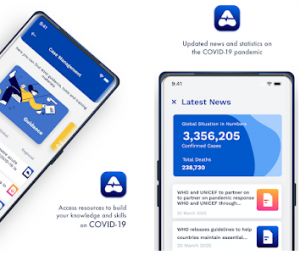The World Health Organisation (WHO) remains the most reliable source of information about Covid-19. The organization may have handled the highest number of visitors to its website since the crisis started.
A website is good enough to keep us updated. However, WHO has introduced two mobile apps to keep both healthcare workers and the public informed.
The move confirms the advice that app developers in Kenya give to potential clients. You can do well with a website or online store. A mobile app makes it even easier and faster to connect with your clients.
Let us look at the apps.
WHO Academy App
Everyone has been crying out for the health workers and WHO heard the cry. While everyone is safely locked at home, healthcare workers must go out and fight the disease.
Even with the best of protective kits, some of the workers have lost their lives while fighting Covid-19.
The death rates are high in countries with limited kits and knowledge about handling patients with the disease.
In Kenya, for example, some of the confirmed cases are of nurses who handled what they thought were normal patients.
The WHO Academy app provides health workers with vast knowledge resources.
Workers have access to much-needed tools and training to protect themselves while giving the best care to infected patients.
The app also provides up-to-the-minute guidance to workers. Think about the convenience of real-time support when handling COVID-19 patients.
The best part of it is that the same information and guidance are available to all health workers around the world.
Healthcare systems in every country can cross-check their practices with the guidelines to determine if they are handling the disease in the right manner.
The number of new cases has been increasing since the pandemic started.
Accurate and timely information to frontline workers is necessary to reverse the trend or flatten the curve as they call it.
WHO conducted a survey in March 2020 involving 20,000 health workers from all parts of the globe. The purpose was to identify the unique and unmet needs during the crisis.
About two-thirds of the participants felt that they needed more knowledge on protection and prevention.
The majority cited the need for on-demand learning. In response, WHO put the knowledge together for the workers in the new Academy App.
Here is a quick lesson. Even with the obvious need to equip healthcare workers, WHO still conducted a survey to determine their needs.
Before engaging app developers in Kenya, it is important to do your survey to identify the real needs in the market.
With such an approach, you will end up with a solution that solves real problems.

WHO Info App
Equipping healthcare workers is not enough to fight the Covid-19 pandemic.
The public needs accurate information to prevent the spread of the disease.
Most of the countries that have suffered the worst effects of the disease ignored safety measures at the beginning.
Where accurate information is unavailable, the public relies on whatever news they can find.
Instead of relying on mainstream media, the WHO Info App provides the latest COVID-19 news on mobile.
Millions of people with smartphones can now follow new developments concerning the crisis.
The issue of vaccines and treatment methods has raised controversies everywhere.
Scientists differ on the best way to treat the disease with some claiming to know the right vaccines.
WHO will use the Info app to update the public on the recommended treatment methods and vaccines.
Such information will curb the ever-rising anxiety about finding a reliable cure.
The information on the latest cases, the number of deaths, and recoveries are organized in countries.
WHO has also given timelines for the data. The promise is to keep the data updated based on its official streams.
Using Technology to Fight Covid-19 in Africa
App developers in Kenya and other countries in Africa have introduced innovative ways to curb Covid-19.
WHO predicted that the cases in Africa could grow from thousands to millions.
While many doubt the accuracy of such predictions, innovators have been working to ensure that the cases do not rise to such levels.
Safaricom Limited has been intensifying its campaigns for its customers to use Mpesa payments instead of cash as a preventive measure.

Both Airtel and Mpesa have waived transfer fees for inter-person money transfers.
Other innovators like Ham Serunjogi and Maijid Moujaled have introduced alternatives to mobile money transfer.
The two introduced Chipper Cash in 2018 to enable users to transfer money across Africa.
You must have come across a Chipper cash ad during this crisis.
Governments have been using social media alongside mainstream media to spread information about the coronavirus.
Technology has also enabled business owners to continue running their operations.
The demand for courier services has increased, especially in the major cities in Kenya.
All types of businesses have been depending on courier services to deliver their products directly to customers.
Digital solutions like Jumia, Glovo, and Uber have helped some businesses keep their customers.
Technology has also played a major role in keeping children engaged during this break from normal schooling.
Parents cannot keep up with the demands of homeschooling while working from home.
Kids are learning online through platforms such as Zoom and Google Meet. The same platforms are available to remote workers.
We have emphasized over time as app developers in Kenya the need to explore different technologies to survive the crisis.
Our team took the first step immediately to work from home. We have kept our operations running through remote working tools.
The expectation is that with the safety measures, the crisis will end within a few months. What happens if the opposite takes place?
Is your business prepared to handle a prolonged lockdown? Such pandemics sometimes come in waves.
Be prepared for both a short-term and long-term period of disrupted business operations. The decisions you make now will help you survive the future crisis that may come.
If you are not in business, think about the digital solutions that you can create for businesses and organizations to help them survive the Covid-19 crisis.
It is safer to provide solutions that will remain useful after the pandemic is over.





